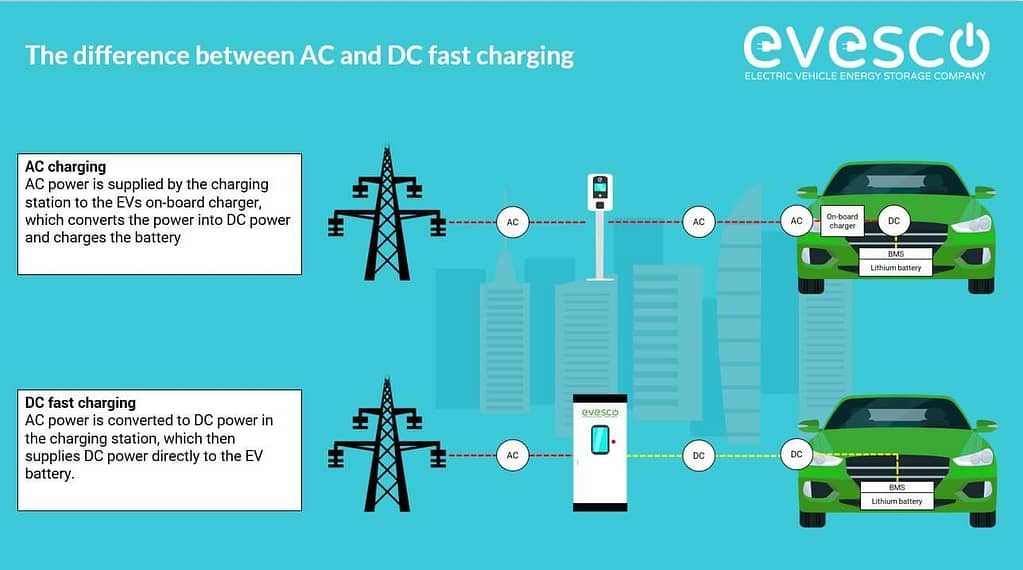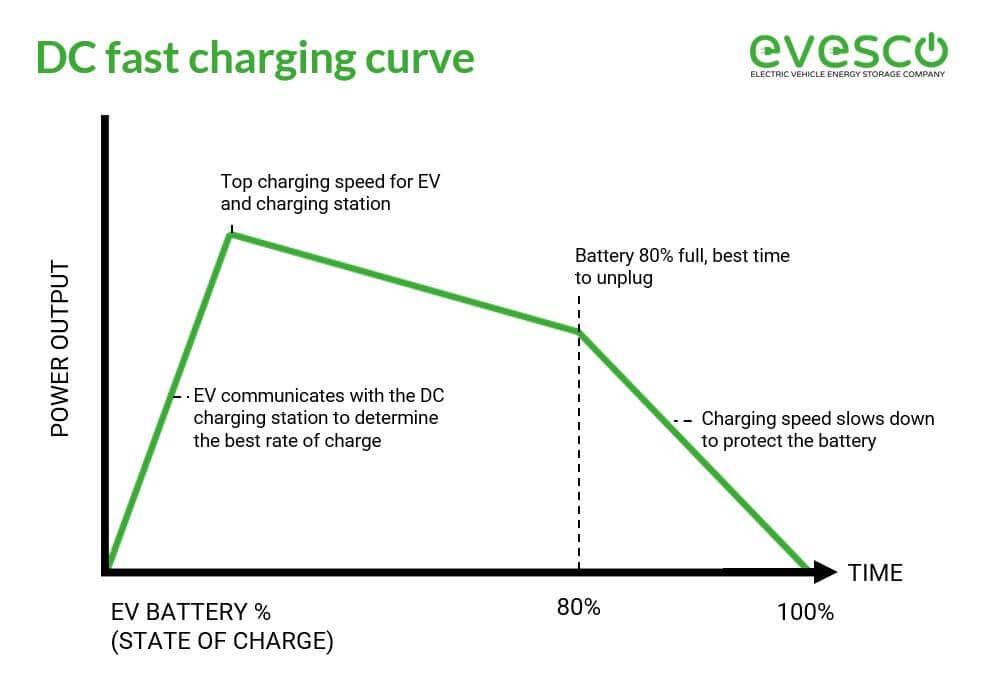Publicly accessible DC fast charging is crucial for the widespread adoption of electric vehicles (EVs). It enables longer journeys and helps alleviate EV range anxiety through quicker EV charging. It also provides the necessary infrastructure for those without access to home charging. In 2022, the total number of DC fast charging stations deployed grew significantly, with the total number in Europe growing to over 70,000 and in the United States 28,000.
With the increasing use of DC fast charging stations, questions are often raised about how fast charging affects battery life and whether DCFC can damage or degrade the battery faster. In this article, we explore the impact of fast charging on the health and longevity of EV batteries and provide best practices for maintaining optimal battery performance.
How Does DC Fast Charging Work?
Before going into details on the impacts of fast charging on EV batteries, it is important to understand how it works. DC fast, Level 3, or Direct Current Fast Charging (DCFC), as it is often referred to, utilizes high-powered charging stations delivering direct current (DC) to charge an EV battery rapidly.
Traditional level 2 charging utilizes alternating current (AC). It requires an onboard charger to convert the current from AC to DC, which is compatible with the vehicle’s lithium battery. In contrast, level 3 charging delivers DC power directly to the EV battery, bypassing the onboard charger. This technology allows fast charging speeds and can charge an EV in minutes rather than hours.

DC fast charging stations communicate with the EV’s battery management system (BMS) to monitor and regulate the charging process. The charging rate and power output are adjusted based on the EV’s charge acceptance rate and battery capacity. Once the battery reaches a certain level, typically around 80%, the charging rate decreases to protect the battery from excessive stress. The illustration below shows a typical DC fast charging curve.

The Impact of Fast Charging on EV Battery Life
One of the biggest concerns with fast charging is that it can damage the electric vehicle’s battery, resulting in a significant loss of vehicle range. So, is DC fast charging bad for the battery? The short answer is no, not really. Fast charging has little impact on battery capacity, battery health, or long-term loss of vehicle range.
Several studies have been conducted to look for a potential link between fast charging and battery degradation. However, each study shows minimal overall impact on battery degradation.
The Research – How Fast Charging Affects Battery Life
Idaho National Laboratory (INL)
Research conducted by the INL compared the battery degradation of Nissan Leaf EVs subjected to different EV charging methods. After 50,000 miles of driving, the vehicles exclusively charged with Level 2 chargers experienced around 24.5% battery capacity reduction; however, those charged with Level 3 DC chargers had a slightly higher capacity loss of 27%. These results indicate that fast charging may contribute to a somewhat higher rate of battery degradation. Nonetheless, the difference is so slight that it should not cause concern for most EV owners.
| Level 2 (1011) | Level 2 (4582) | DCFC (2183) | DCFC (2078) | |
| Baseline (new) | 23.31 kWh | 23.59 kWh | 23.38 kWh | 23.24 kWh |
| 10, 000 miles | 21.75 kWh | 22.3 kWh | 21.97 kWh | 21.93 kWh |
| 20,000 miles | 21.53 kWh | 21.51 kWh | 21.64 kWh | 21.07 kWh |
| 30,000 miles | 19.99 kWh | 20.2 kWh | 19.42 kWh | 19.33 kWh |
| 40.000 miles | 18.10 kWh | 18.34 kWh | 17.53 kWh | 17.37 kWh |
| 50,000 miles | 17.51 kWh | 17.77 kWh | 16.94 kWh | 16.92 kWh |
It’s worth noting that the INL study was conducted in extreme heat conditions, which can already impact battery life. Real-world driving conditions and sophisticated thermal management systems in modern EVs help mitigate any impact of fast charging on battery life.
You can see the complete study here: Idaho National Laboratory Study
Recurrent Motors Inc
Research by Recurrent Motors Inc. analyzed the impact of fast charging on over 12,500 Tesla vehicles in the United States. The study compared Tesla cars that predominantly used DC fast charging to those that rarely did. The findings revealed no significant difference in battery capacity loss between vehicles that fast charged more than 90% of the time and those that did so less than 10%. These results suggest that frequent fast charging of an EV does not lead to notable battery degradation. The study also emphasized the importance of battery preconditioning in extreme temperatures for optimal charging efficiency and battery health.
You can explore the findings in detail here: Recurrent Motors Inc. Impacts
Geotab Inc
The Geotab study on EV battery health revealed that while Level 2 charging is often cited as the optimal method for EVs, the difference in battery health between vehicles predominantly using Level 2 and those using DC fast charging was minimal. Although DCFC can strain batteries due to high currents and temperatures, the overall impact on battery degradation was insignificant compared to Level 2 charging. This finding suggests that both EV charging levels can be used effectively with minimal differences in their effects on battery life. The study also showed that EVs driven in hot climates had a higher battery capacity loss than those driven in moderate temperatures.
You can explore the detailed analysis in the article here: Geotab Inc Analysis

The studies collectively indicate that while fast charging may slightly degrade the battery faster than Level 2 charging, the overall impact is minimal and should not be a major concern for EV owners. These findings reassure EV users, suggesting that various charging levels, including fast charging, can be utilized effectively without substantial detriment to the battery.
It is worth noting, however, that the studies all suggested extreme temperatures can have an impact on battery health and longevity. Most modern electric vehicle batteries are designed to be fast charged and have integrated thermal management systems to manage high currents from DC fast charging. These thermal management systems also help maintain the vehicle battery’s optimal temperature.
Fast Charging Best Practices
While fast charging may have a minimal impact on battery health, following best practices can help maintain optimal battery performance. Here are some recommendations for EV owners to maximize the life of their EV battery:
- Maintain State of Charge (SoC): Keep your EV’s SoC between 20-80%, especially when parked for extended periods. Full charges are best utilized before long-distance journeys.
- Opt for Level 2 Charging: Although DC fast charging is convenient for high-use vehicles, Level 2 charging overnight suffices for most charging needs.
- Manage Weather Effects: Protect your battery from extreme temperatures. Use shade where possible when the weather is hot, and precondition the battery when temperatures are cold before charging.
- Utilize EVs Actively: Don’t hesitate to use EVs frequently, as high usage doesn’t significantly impact battery health.
- Follow Manufacturer Guidelines: Adhering to specific charging recommendations from your EV’s manufacturer is crucial for maintaining battery health.
- Utilize Scheduled Charging: Set specific charging times to benefit from off-peak electricity rates and ensure the battery is fully charged for planned journeys, while avoiding prolonged periods of high SoC
In addressing the concern of whether DC fast chargers damage EV batteries, current research and evidence suggest that the impact is minimal. Fast charging technology has advanced, ensuring that batteries can rapidly charge without significant degradation. While there may be slight differences in battery life when comparing fast charging with slower charging, these are not substantial enough to deter the use of DC fast chargers. Following best battery care and charging practices can further mitigate any potential adverse effects. The future of fast charging looks promising, with advancements in charging infrastructure and battery technologies on the horizon. Ultimately, the convenience and efficiency of DC fast charging outweigh its minimal impact on battery life, supporting the wider adoption of electric vehicles.







